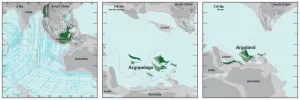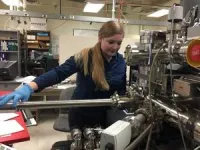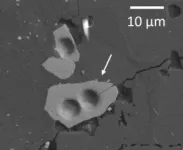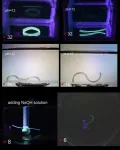(Press-News.org) Geologists have long known that around 155 million years ago, a 5000 km long piece of continent broke off western Australia and drifted away. They can see that by the ‘void’ it left behind: a basin hidden deep below the ocean known as the Argo Abyssal Plain. The underwater feature also lends its name to the newly formed continent: Argoland. The structure of the seafloor shows that this continent must have drifted off to the northwest, and must have ended up where the islands of Southeast Asia are located today. But surprisingly, there is no large continent hidden beneath those islands, only the remnants of small continental fragments that are also surrounded by much older oceanic basins. So what happened to Argoland? Geologists at Utrecht University have now managed to reconstruct the history of the lost continent. As it turns out, Argoland is in fragments, but is still there. “Otherwise, we would have been faced with a major scientific problem.”
Geologists differentiate the earth’s crust into the heavier oceanic crust and lighter continental crust. These lighter continents may be partially hidden below sea level, as was also the case with another ‘lost’ continent, Greater Adria. Like Argoland, it also consisted of different fragments separated by narrow ocean basins, which eventually became part of a single tectonic plate. At some point in the past, Greater Adria plunged into the earth’s mantle, but the top layer stayed behind and was folded to form the mountains of Southern Europe. Argoland, however, left no such trace in the form of folded rock strata.
Traces from foregone eras
“If continents can dive into the mantle and disappear entirely, without leaving a geological trace at the earth’s surface, then we wouldn’t have much of an idea of what the earth could have looked in the geological past. It would be almost impossible to create reliable reconstructions of former supercontinents and the earth’s geography in foregone eras”, explains Utrecht University geologist Douwe van Hinsbergen. “Those reconstructions are vital for our understanding of processes like the evolution of biodiversity and climate, or for finding raw materials. And at a more fundamental level: for understanding how mountains are formed or for working out the driving forces behind plate tectonics; two phenomena that are closely related.”
Collage
Van Hinsbergen and his colleague Eldert Advokaat were curious about what the geology of Southeast Asia could tell about Argoland’s fate. “But we were literally dealing with islands of information, which is why our research took so long. We spent seven years putting the puzzle together”, says Advokaat. “The situation in Southeast Asia is very different from places like Africa and South America, where a continent broke neatly into two pieces. Argoland splintered into many different shards. That obstructed our view of the continent’s journey.” But that was until he realised that the fragments arrived at their current locations at around the same time, which clarified how they once connected together. The shards formed a collage: Argoland is hidden beneath the green jungles of large parts of Indonesia and Myanmar.
Argopelago
That splintering is typical for the microcontinent. There was never a single clearly delineated and coherent continent of Argoland, but rather an ‘Argopelago’ of microcontinental fragments separated by older oceanic basins. In that it resembles Greater Adria, which by now has almost entirely subducted into Earth’s mantle, or Zeelandia, the largely submerged continent east of Australia. “The splintering of Argoland started around 300 million years ago”, Van Hinsbergen adds.
Seamless
The puzzle that Advokaat and Van Hinsbergen have solved fits seamlessly between the neighbouring geological systems of the Himalayas and the Philippines. Their detective work also explains why Argoland is so fragmented: the break-up accelerated around 215 million years ago, as the continent shattered into thin splinters. The geologists conducted field work on several islands, including Sumatra, the Andaman Islands, Borneo, Sulawesi and Timor, to test their models and determine the age of key rock strata.
END
Finding Argoland: how a lost continent resurfaced
Geological puzzle solved after seven years of research
2023-10-23
ELSE PRESS RELEASES FROM THIS DATE:
Does diabetes affect the survival of individuals with colorectal cancer?
2023-10-23
Complications of diabetes can have numerous negative health effects, from impaired vision and nerve damage to kidney dysfunction and heart disease. In an analysis of information on adults with colorectal cancer, patients who also had diabetes—particularly those with diabetic complications—faced a higher risk of dying early. The results are published by Wiley online in CANCER, a peer-reviewed journal of the American Cancer Society.
For the study, Kuo‐Liong Chien, MD, PhD, of National Taiwan University, and his colleagues ...
Better regulation of mental health ‘therapies’ urgently needed to protect the vulnerable
2023-10-23
A rise in psychological pseudoscience is putting people at risk, psychologists have warned, with social media and celebrity endorsements partly to blame.
Mental health apps, mood-boosting supplements and energy therapies are among the therapies that could do ‘more harm than good’ according to psychologists Jonathan Stea and Stephen Hupp in their new book Investigating Clinical Psychology.
“As discourse around wellness, mental health, therapy, and access to these resources increasingly enter the public domain, the potential of coming across persuasive pseudoscience has also increased,” Stea explains.
“This is the age of health misinformation. It is everywhere. ...
Do people everywhere care less about their cats than their dogs?
2023-10-23
Do canines get more care? Some studies have suggested pet owners are less emotionally attached to and less willing to finance care for cats than dogs, possibly because of cats’ behavior: cats may be perceived as caring less about humans and needing less care in return. But these studies are often conducted on non-representative samples and don’t consider possible cultural differences in attitudes to pets. A team of scientists led by Dr Peter Sandøe of the University of Copenhagen decided to investigate further.
“We and others have found that people are willing to spend much less on their cats than ...
Association for Molecular Pathology appoints Lauren S. Menser as Chief Executive Officer
2023-10-23
ROCKVILLE, Md. – Oct. 23, 2023 – The Association for Molecular Pathology (AMP), the premier global molecular diagnostic professional society, today announced the appointment of Lauren S. Menser, CAE, as its Chief Executive Officer, effective January 3, 2024. Menser will succeed Mary Steele Williams, MNA, MT(ASCP)SM, CAE, after her retirement. AMP’s national search for a new executive leader was administered by an outside consulting firm and overseen by a diverse group of member volunteers.
Menser has served AMP in various capacities for more than 17 years. Since 2016, she has served as Director of Strategic Development, ...
Predictors of opioid overdose after prescription for chronic pain
2023-10-23
A large study published in CMAJ (Canadian Medical Association Journal) https://www.cmaj.ca/lookup/doi/10.1503/cmaj.230459 identified 10 predictors of opioid overdose after prescription for chronic pain, which can help clinicians engage in shared decision-making with patients around opioid prescribing.
“The opioid crisis has generated interest in identifying patients at higher risk of addiction or overdose and has led to the development of several screening tools; however, these instruments have either not been validated or shown poor psychometric properties,” writes Dr. Li Wang, a researcher and methodologist at the ...
Plant-based isn't just about burgers anymore
2023-10-23
A team of University of Waterloo researchers has created smart, advanced materials that will be the building blocks for a future generation of soft medical microrobots.
These tiny robots have the potential to conduct medical procedures, such as biopsy, and cell and tissue transport, in a minimally invasive fashion. They can move through confined and flooded environments, like the human body, and deliver delicate and light cargo, such as cells or tissues, to a target position.
The tiny soft robots are a maximum of one centimetre long and are bio-compatible and non-toxic. The robots are made of advanced hydrogel ...
Better use of existing drugs increases cervical cancer survival and reduces recurrence
2023-10-22
The INTERLACE phase III trial, funded by Cancer Research UK and UCL Cancer Trials Centre, assessed whether a short course of induction chemotherapy (IC) prior to chemoradiation (CRT) could reduce the rate of relapse and death among patients with locally advanced cervical cancer. As part of an analysis of clinical data, the preliminary results will be presented at the European Society for Medical Oncology (ESMO) congress on Sunday 22 October 2023.
The peak incidence of cervical cancer is in women in their early thirties, with around 3,200 new cases each year in the UK. CRT has been the standard treatment for cervical cancer since 1999, but despite improvements ...
Adding immunotherapy to chemotherapy regimen improves survival in metastatic bladder cancer patients
2023-10-22
New York, NY (October 22, 2023) — A clinical trial co-led by Mount Sinai researchers is the first to show that using chemotherapy with immunotherapy resulted in improved survival in patients with an advanced type of bladder cancer. The results were simultaneously reported in The New England Journal of Medicine and at the annual meeting of the European Society for Medical Oncology.
The randomized phase 3 trial, named ”CheckMate 901,” showed significantly improved outcomes in patients who received the immunotherapy nivolumab with a combination of the chemotherapies gemcitabine and cisplatin, ...
Dual-action drug produces positive results in patients with advanced neuroendocrine tumors, trial finds
2023-10-22
Cabozantinib, which targets tumor cell growth and tumor blood vessel growth, sharply improved progression-free survival over placebo in patients with extra-pancreatic and pancreatic neuroendocrine tumors
Boston - A drug that simultaneously strikes cancer cells' growth circuits and pipeline to the bloodstream produced encouraging results in a clinical trial involving patients with advanced neuroendocrine tumors, according to a study led by Dana-Farber Cancer Institute investigators.
Jennifer Chan, MD, MPH, director of the Program ...
Alliance presents detailed results from phase III CABINET pivotal Trial evaluating cabozantinib in advanced neuroendocrine tumors at ESMO 2023
2023-10-22
The Alliance for Clinical Trials in Oncology today announced detailed results will be presented at ESMO 2023 from CABINET (A021602), a phase III pivotal trial evaluating cabozantinib compared with placebo in two cohorts of patients with previously treated neuroendocrine tumors: one cohort of patients with advanced pancreatic neuroendocrine tumors (pNET) and a second cohort of patients with advanced extra-pancreatic NET (epNET). The study met the primary objective for each cohort, demonstrating that cabozantinib provided dramatic improvements in median progression-free survival (PFS) for the patients in the pNET and epNET cohorts. ...
LAST 30 PRESS RELEASES:
ASU researchers to lead AAAS panel on water insecurity in the United States
ASU professor Anne Stone to present at AAAS Conference in Phoenix on ancient origins of modern disease
Proposals for exploring viruses and skin as the next experimental quantum frontiers share US$30,000 science award
ASU researchers showcase scalable tech solutions for older adults living alone with cognitive decline at AAAS 2026
Scientists identify smooth regional trends in fruit fly survival strategies
Antipathy toward snakes? Your parents likely talked you into that at an early age
Sylvester Cancer Tip Sheet for Feb. 2026
Online exposure to medical misinformation concentrated among older adults
Telehealth improves access to genetic services for adult survivors of childhood cancers
Outdated mortality benchmarks risk missing early signs of famine and delay recognizing mass starvation
Newly discovered bacterium converts carbon dioxide into chemicals using electricity
Flipping and reversing mini-proteins could improve disease treatment
Scientists reveal major hidden source of atmospheric nitrogen pollution in fragile lake basin
Biochar emerges as a powerful tool for soil carbon neutrality and climate mitigation
Tiny cell messengers show big promise for safer protein and gene delivery
AMS releases statement regarding the decision to rescind EPA’s 2009 Endangerment Finding
Parents’ alcohol and drug use influences their children’s consumption, research shows
Modular assembly of chiral nitrogen-bridged rings achieved by palladium-catalyzed diastereoselective and enantioselective cascade cyclization reactions
Promoting civic engagement
AMS Science Preview: Hurricane slowdown, school snow days
Deforestation in the Amazon raises the surface temperature by 3 °C during the dry season
Model more accurately maps the impact of frost on corn crops
How did humans develop sharp vision? Lab-grown retinas show likely answer
Sour grapes? Taste, experience of sour foods depends on individual consumer
At AAAS, professor Krystal Tsosie argues the future of science must be Indigenous-led
From the lab to the living room: Decoding Parkinson’s patients movements in the real world
Research advances in porous materials, as highlighted in the 2025 Nobel Prize in Chemistry
Sally C. Morton, executive vice president of ASU Knowledge Enterprise, presents a bold and practical framework for moving research from discovery to real-world impact
Biochemical parameters in patients with diabetic nephropathy versus individuals with diabetes alone, non-diabetic nephropathy, and healthy controls
Muscular strength and mortality in women ages 63 to 99
[Press-News.org] Finding Argoland: how a lost continent resurfacedGeological puzzle solved after seven years of research




